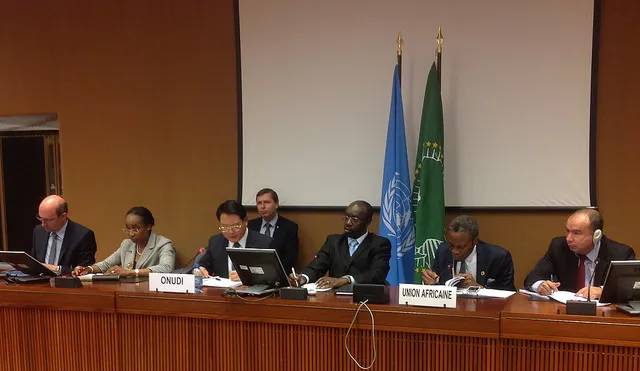Assessing the progress made in the last 50 years, African leaderships agree that a lot more work is needed to achieve the "
Africa We Want by 2063" vision. They stand together with strong conviction in their shared history against issues like
slavery, colonialism and all forms of racial exploitation. They realise that for Africa to live the vision, a unified and strong approach is required.
It has been over 50 years that the Organization of African Unity (OAU) came in to formation. A lot has transformed in the continent ever since.The OAU became the African Unity (AU), from 32 independent countries, it is 54 countries; along with tremendous economic, political and social evolution. Domestic as well have international paradigms have changed and Africa is a more important player in the realm of international politics.
Initiatives such as the Monrovia Declaration (1979), the Lagos Plan of Action (1980), the establishment of the African Economic Community (AEC) and Regional Economic Communities (RECs) in the 2000s have all contributed to the growth of Africa. Addis Ababa (May, 2013) saw the Solemn Declaration of the Assembly of Heads of State and Government of the African Union committing to a long-term national and continental development.
The document published by the African Union is an extensive piece of research covering historic background, success and failures of the past, plans for the next five decades along with the challenges. The aim is to build an Africa that focuses on inclusive and sustainable development, ensuring good governance, democracy, and respect for human rights, law and order throughout the continent. The picture is of a peaceful and secure
Pan-Africa with a strong cultural identity, common heritage, values and ethics. Africa is working towards making the development people driven with inclusion of the youth and women to strengthen the influence that the continent brings on the global platform.
The way forward presented in the document by the African Union is very a step-by-step structure to achieve the above goals. In the field of social and human development education and skill building are emphasized upon. Primary, secondary and tertiary education each faces their own set of challenges, from drop-outs to lack of educational infrastructure or teachers. Health is a priority, to provide better medical facilities in urban and rural Africa and decrease the casualties due to malaria, HIV/AIDS, maternity and child mortality.
Africa being a young continent, with the average age at
18 years and home to over 1.2 billion people, the incorporation of demographic trends is essential. There is pressure on the system to create more employment to keep this population skillfully employed. The growth of the agriculture manufacturing and services sector is integral to Africa’s vision. Africa is still a predominantly agrarian economy now transitioning towards industrialization, hence the need for urbanization as the migration to cities is rapid. While the continent still looks at taking advantage of its blue/ocean economy due to its coastline of
32,000 kilo meters, it is still in its initial stages. An efficient process of harnessing energy is required as Africa faces the challenge of low generation capacity, Vision 2063 aims to use modern and renewable sources of energy that Africa is rich in.
The economic growth of Africa, after the crisis of the 1970s and 1980s, has been good. The plan of building their financial and non-financial institutes, private sector contribution to overall GDP, technological advancement and a faster rate of industrialization will make it better. The shift from developmental partnerships to
Strategic Partnerships such as the Africa-EU Partnership, Africa-China (FOCAC) and Africa-India (IAFS) partnerships. RECs with their individual agendas in alignment to the Vision 2063 bring a more promising future.
Anticipated challenges
The world we live in today is dynamic and the goals set for the Vision 2063 are bound to face some internal and external challenges in its execution. The individual nations face challenges; security issues without a concrete solution, instability and insecurity have haunted the development of countries over five decades. The divide in society and economic inequalities is as high as 60 percent in some of the African states, the organized crime and drug trafficking only adds to the problems.
Not unlike the rest of the developing world, Africa is confronted by the issue of religious extremism, mishandling of diverse cultures and ethnic groups and corruption. As pointed out above, Africa is a young continent and the failure to empower the youth will prove it to be a bane. The rise of Africa’s deaths by diseases, along with climate change and natural disasters are only some of the challenges that can be anticipated.
Apart from these there are some problems that are still grey and unclear, that are not in any single entity’s control. Climate change and energy, moving from non-renewable sources to renewable sources and increasing cost of industrialization is something that the developing world worries about. The depletion of non-renewable energy is bound to happen in the near future and the world is not prepared for it.
In the technological world, information does not hold valid three years from when it is generated. The global structure of economics and politics is also seeing a change-from USA being at the center stage to China and India gaining that place will see consequences in the functioning of many regional and international organizations. Fifty years is a large time , these are some of the unforeseen challenges that Africa will need to gear up for.
In conclusion, the Vision 2063 ambition is an ideology that brings the states of Africa together. It is an achievable future that the leaders have unanimously envisioned. With most of the challenges in the known realm, Africa truly has the potential to change the way the world functions in the coming decades.
The views expressed above belong to the author(s). ORF research and analyses now available on Telegram! Click here to access our curated content — blogs, longforms and interviews.




 PREV
PREV

